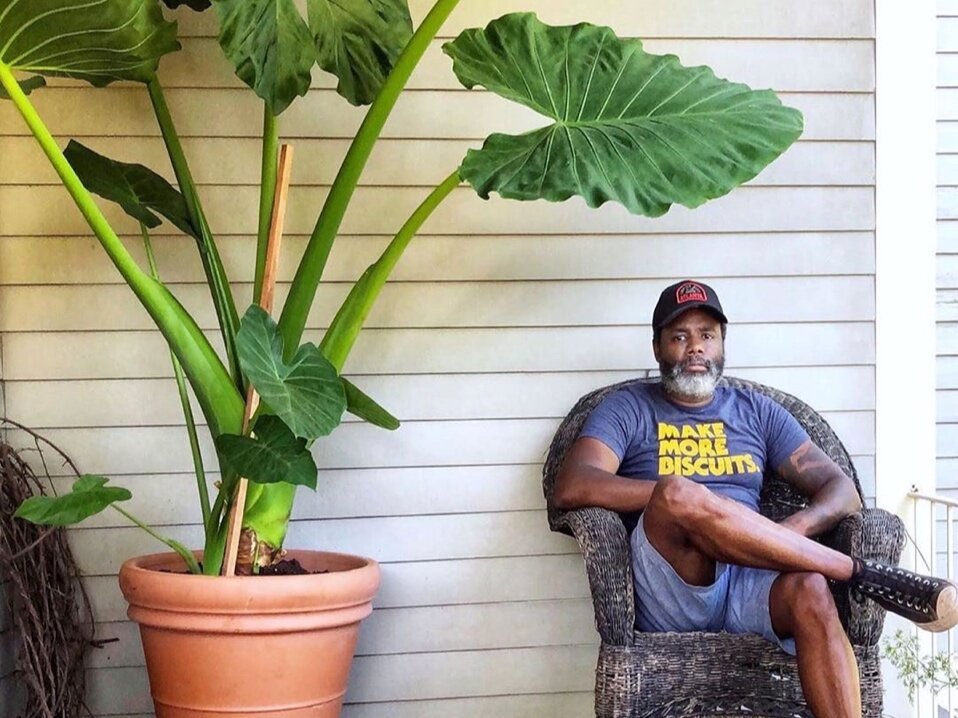An excerpt from Down Along with That Devil’s Bones: A Reckoning with Monuments, Memory, and the Legacy of White Supremacy
by Connor Towne O’Neill
Connor Towne O’Neill grew up in central Pennsylvania thinking slavery and racism were primarily Southern problems. In moving to Alabama and researching his new book about Confederate monuments, he gained a more accurate picture of his family, himself, and this whole nation.
[My visit to the Selma battlefield] had been my first trip to a battlefield other than Gettysburg, which is a National Military Park. To go there is to go there. There are park rangers, a visitor’s center, a massive 360-degree “cyclorama” painting of Pickett’s Charge. It's ground hallowed by Lincoln himself. Which entails a cordoning off. Physically, obviously, but also psychically. The battlefield is not enmeshed into the fabric of daily life of central Pennsylvania as it is in Selma, where people were, at that moment, playing rounds of golf on land where the battle was fought, or drinking whiskey gingers and complaining about the fees to reenact a battle to which they once had porch-side seats. It gets dropped so often as a cliché about the South, how the past is never past, but that’s true everywhere. What seemed more distinctive was how the past intruded into daily life here in such persistent, immediate ways.
At the time I was supporting myself by working as a landscaper. It was a small outfit, just three guys, and we did mostly home-sprinkler maintenance in the Tuscaloosa suburbs. When work was slow, our boss would find “honey-do’s” — small personal jobs — to help us hourly workers make enough for rent. He was kind like that. But every once in a while, on these jobs, the state’s fraught history would spill out like a busted pressure line. Take one day, just a few months earlier, over in Demopolis, a few towns west of Selma. We were clearing brush and doing some upkeep on an old mausoleum. It was in the family plot of our boss’s mother’s side — “Family business,” as our boss put it, shrugging, as if he were asking us to shovel out a few yards of mulch in his backyard.
Allen Glover, the man for whom the mausoleum was built, wasn’t just an ancestor, he had actually founded Demopolis in 1819, when he and his brother and the 17 people they had enslaved came to the canebrakes of Alabama from the South Carolina low country. By the time the war came, the enslaved people on the Glover family’s 3,000-acre plantation were bundling enough cotton for the Glovers to afford their own steamboat. It was one thing to read about this history, quite another to prune the crepe myrtle that shaded the grave of the man who made that happen in Marengo County.
Whether in the parks where you played baseball, or at the jobs you worked for rent money, the past was inescapable and always underfoot. Granted, to approach this history with the binary framework provided by the Civil War can make for a simplistic morality play. One in which it’s all too easy and too obvious for a Yankee to traipse into a Southern cemetery and clutch his Northern pearls. Robert Penn Warren called this instinct the “treasury of virtue” — the white Northerner’s feeling that, by dint of our affiliation with the Union, the great, emancipating army, well, then we were (and remained) morally upstanding, unimpeachably good. It was a feeling that could render us “happy in forgetfulness,” the Civil War like an event horizon beyond which our own pasts vanish.
But what were we forgetting? What was reflected in the markers of my own family’s history that we’d rather not look at? I grew up in Central Pennsylvania, but it was my mother’s New England ancestry that loomed. And with good reason: Plymouth Rock, the gallows at Salem — these were the monuments to which we traced our roots. My mother’s line claims two passengers on the Mayflower, and we are directly descended from Rebecca Nurse (née Towne), whom you might know as Goody Nurse, the elderly midwife hanged as a witch in Arthur Miller’s The Crucible. Her sister, Mary Esteys, also stood trial and was sent to the gallows that year. “The Witchcraft Delusion,” my great-grandfather George writes in the genealogy he compiled, “took a heavy toll of this family.” A reference guide at the front of that genealogy also lists “Soldiers in the Indian and Colonial Wars,” “Soldiers in the Revolution,” (with special emphasis on those that “Respond[ed] to Lexington Alarm,”) along with those “Massacred by Indians” and those who were “Scalped but Recovered.”
I have a copy of the genealogy, which was completed and published by my grandfather. It’s a lovely, leather-bound book, the title Ancestry Of My Parents embossed in gold on the deep maroon cover. I took it down from the shelf recently and a folded piece of paper fell into my lap, a note in my mother’s handwriting. On one side she’d drawn a family tree and on the other set down some reflections — “Legacy,” she titled it. In it, she describes her father as “a man whose past engulfed and consumed him.” He was a man, my mother writes, “born to the wrong century.” In his view, the past was a better time and he looked upon it with admiration and longing.
I never met Grandpa Towne; he died before I was born. Even so, growing up I absorbed his misty-eyed reverence as if by osmosis.
His was the prevailing attitude reinforced annually on Patriot’s Day, Independence Day, Columbus Day, Thanksgiving. Pilgrims, Puritans — these were my people. Pious, sacrificing, persecuted people, blown across the Atlantic on the winds of the Enlightenment, fleeing from and then rebelling against tyrants to establish a new nation founded on liberty. They were people who disembarked the Mayflower onto Plymouth Rock, who refused to renounce their God even as the hangman approached. People whose valor made the colonies possible and whose ideals of freedom and democracy were the bedrock on which this nation was built.
That’s how the story goes, at least in the “don’t think about it too much and pass the cranberry sauce” version. Conveniently, it leaves out the fact that the first enslaved African brought to New England was brought to Salem. Or that nearly half the wealth of colonial New England was generated by enslaved people on the sugar plantations of the West Indies. Or that my ancestors who lost their scalps did so while embarked on a campaign of displacement, dispossession, and destruction of the native peoples from whom they’d stolen the land that became their city on the hill.
We don’t talk about that part so much. Still, you can catch glimpses of the other half of this story while paging through the Towne genealogy. The book is peppered with references to “freemen.” Rebecca Nurse’s life, as recounted before the magistrates in 1692, is described in terms of “purity and goodness,” while her sister Mary “recall[ed] the perfect spirit of the Prisoner at Calvary.” And Mary’s accuser, Mercy Short, claimed to be tormented by the Devil, whom she described as “a Short and a Black Man … not of Negro, but of a Tawney, or an Indian colour.” Free, pure, Christlike; tawny, black, the Devil — these were their notions of self and others. And it is by this formula that the early white Americans could abide the contradictions inherent in founding a nation based on principles of life and liberty on property that was stolen land. And by this formula they could justify the enslavement of others on that land.
This is the most enlightening and discomfiting part of reading Edward E. Baptist’s book about slavery and the growth of American capitalism: how implicated the North is in the story. To be sure, far fewer enslaved people were brought to the Northern colonies, and yes, slavery was abolished in the North earlier than in the South. But still, Northern businessmen availed themselves of the profits of the slave system at every level and, in so doing, transformed the country into an industrial behemoth. Bankers, creditors, investors, speculators, and industrialists all had a vested interest in slavery’s perpetuation and expansion. Pointing out that most Northern Unionists opposed emancipation in the run-up to the Civil War, Baptist posits that white American power struggles in that era were “on one level not driven by a contest over ideals but [by] the best way to keep the stream of cotton and financial revenues flowing.” That wealth flowed from the fields surrounding Selma into the bank vaults of New York, and the cotton traveled to the mills of Providence and Boston and, further inland, to Framingham (where my grandfather later worked while he completed the Towne genealogy). Northerners were distanced from the violence, from the inhumanity of the practice, but were implicated all the same. I’d been trudging through Alabama’s cemeteries, battlefields, and archives, but the history I was encountering wasn’t someone else’s, it was mine, too. The more I came to know Selma, the more I was coming to know the country, my family, myself.
To help me to understand what it was like to live in Selma, historian Alston Fitts asked me to imagine what it would be like to be reminded, every year on your birthday, of the worst thing you’d ever done. Up north, we’d rather pass the cranberry sauce, happy in forgetfulness. The distance afforded by the financial instruments of 19th-century capitalism persists to this day in Northern memory. It took my moving to Alabama and reporting this book to realize a hard truth about home, a place that suddenly felt both farther away and closer at hand.
Connor Towne O’Neill’s writing has appeared in New York magazine, Vulture, Slate, RBMA, and the Village Voice, and he works as a producer on the NPR podcast White Lies. Originally from Lancaster, Pennsylvania, he lives in Auburn, Alabama, where he teaches at Auburn University and with the Alabama Prison Arts + Education Project. Down Along with That Devil’s Bones is his first book.






